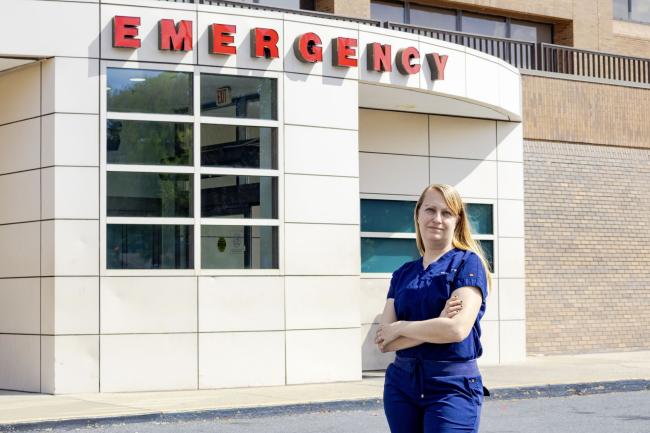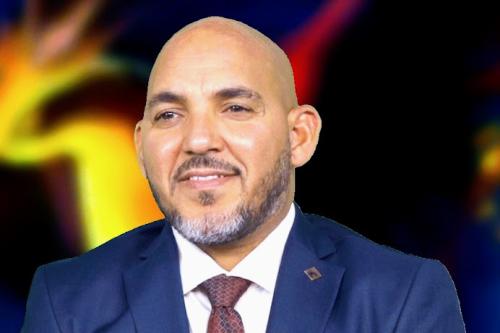Ask Stephanie Rolin what she does, and most people assume she’s a detective.
“When I say I’m in forensic psychiatry, people think CSI,” she said. “But I don’t investigate crime scenes. I work at the intersection of medicine and the law.”
That intersection defines the work of Rolin, MD, MPH, who joined the Howard University College of Medicine faculty this summer as an assistant professor of psychiatry. At Howard, Rolin divides her time between research, clinical work, and teaching. Her NIH-funded research focuses on keeping patients with serious mental illnesses connected to care and out of the judicial system. Clinically, she works in the emergency department of Howard University Hospital, supervises at the outpatient clinic, and covers inpatient psychiatry.
Rolin has long had a passion for safety-net hospitals with strong community-oriented missions, like Howard University Hospital. Staff at the hospital treat a wide range of patients, including individuals in psychiatric crisis and those whose care is complicated by housing or economic instability or other vulnerabilities.
“A safety-net hospital is the place that catches you when you fall,” Rolin said of Howard University Hospital. “I wanted to be at a place where one bad day doesn’t derail someone’s entire life.”
Her passion for psychiatry and the community-oriented mission stems from her own background. Her family immigrated to the United States from Belgium, often living in transition and without a safety net — a reality that fueled her initial interest in medicine.
“A safety-net hospital is the place that catches you when you fall,” she said. “I wanted to be at a place where one bad day doesn’t derail someone’s entire life.”
One urgent issue Rolin confronts as a forensic psychiatrist involves the controversial term “excited delirium” — a label long used in law enforcement reports to explain sudden deaths in custody. Although the diagnosis lacks scientific legitimacy, it continues to surface in police trainings and autopsy reports, even as states like Colorado and California have moved to ban its use.
“Excited delirium is not a recognized medical diagnosis,” Rolin said. “There are no criteria. It’s nonspecific. No one knows what it means.”
Rolin said the term is often used to justify actions that unfairly target minority men.
As a member of the American Psychiatric Association’s Council on Psychiatry and the Law, Rolin is helping revise the APA’s stance to make the science clear. She calls the process “both necessary and overdue,” pointing to recent custody deaths where “excited delirium” has appeared in official accounts while masking underlying medical realities.
“We’re revising the statement to reflect updated medical consensus,” Rolin said. “The goal is to highlight the harms that occur when real medical conditions go unrecognized or untreated because of this fake diagnosis.”
Rolin’s specialty, forensic psychiatry, is a field she acknowledges many people misunderstand. Forensic psychiatrists work with patients whose mental health care is affected by the legal system — whether assessing competency to stand trial, understanding criminal responsibility, or helping staff and patients navigate situations when law enforcement shows up in medical spaces.
Through teaching in the College of Medicine, she is seeking to equip future psychiatrists to navigate these high-stakes intersections between patient care and legal pressures and responsibilities.
“One of the questions we were just discussing was, ‘What do we do if ICE shows up at the emergency department?’” she said. “Residents also want to know what’s private versus public in medical records, especially with cases where the Justice Department subpoenas information.”
She said her training as a forensic psychiatrist gives her a different lens, making her especially attuned to how policing, incarceration, and legal systems affect patients and the care they receive.
Outside the hospital, Rolin co-hosts a weekly health podcast with her sister, Alicia Rolin, MD, a pediatrician at Children’s National Hospital. Called Rolin Forward, the podcast breaks down complicated health topics for families — from vaccine safety to myths about diet “curing” schizophrenia — while tackling misinformation head-on.
“We grew up watching Oprah and Dr. Oz with our mom,” Rolin said. “I understand how powerful those sources of information are for families. But right now, a lot of what’s out there doesn’t align with the evidence. Our goal isn’t to tell people what to do — it’s to give them the facts so they can make informed decisions.”
The podcast reflects Rolin’s broader belief that scientific work doesn’t end when a journal article is published.
“It’s not enough anymore to just do the research,” she said. “We have to communicate it.”
Photo credit: Skyla Jeremiah, Office of University Communications
###





